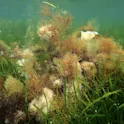1,071 news posts

Climate action
02 Jun 2023
Underwater forest’s recovery offers hope for marine restoration across the globe
by Angharad Brewer Gillham, Frontiers science writer Image/Enric Ballesteros Scientists show that efforts to restore the building blocks of marine ecosystems are paying off, with macroalgae that provide food and shelter for other species bouncing back over 10 years of growth in an underwater seaweed forest in the Mediterranean Sea. Human activity has degraded ecosystems and damaged biodiversity around the world, but ecosystem restoration offers hope for the future. Scientists studying the restoration of underwater seaweed forests which provide other species with food and shelter have found that 10 years of restoration efforts have helped a damaged forest regrow to richness and strength comparable to forests that have never been disturbed. “Macroalgal forests are found along over one-third of the world’s coastlines and underpin entire ecosystems,” said Dr Emma Cebrian of the Centre d’Estudis Avançats de Blanes, corresponding author of the study in Frontiers in Marine Science. “In 2011, a restoration action took place in the Bay of Maó, Menorca, where a macroalga species was reintroduced in the area where it used to thrive. After 10 years, we found that the associated algal species returned to the habitat, and with them, the ecosystem functions they provide.” Under the sea Cebrian […]

Frontiers news
01 Jun 2023
Frontiers appoints Julian Oei as Group Business Officer
Digital media executive Julian Oei has been appointed to the position of group business officer by the open access publisher Frontiers. In the newly created role, Mr Oei will join the leadership team and lead the expansion of Frontiers’ product and services portfolio into innovative data driven areas adjacent to the organization’s core publishing services.

Health
31 May 2023
‘Rethinking health beyond disability and disease’
by Liad Hollender, Frontiers science writer Image: Prof Gerold Stucki Is there more to health than just the absence of disease? According to a team of researchers from Swiss Paraplegic Research and the University of Lucerne, the answer is a resounding ‘yes’. In an article published in Frontiers in Science, the researchers explain how ‘human functioning’ – a new assessment of health – could revolutionize healthcare, and even help advance the UN 2030 Sustainable Development Agenda. But what is human functioning and why is it such a powerful concept? To find out, Frontiers spoke with the team – Prof Jerome Bickenbach, Prof Sara Rubinelli, Cristiana Baffone, and Prof Gerold Stucki. How would you define human functioning? Gerold: Functioning is a concept developed by the World Health Organization (WHO), which constitutes a rethinking of health that goes beyond disability and disease. It encompasses people’s biological health as well as their ‘lived health’ – the activities they perform in their daily lives. What activities? Everything from eating and grooming, to working and socializing. This way of thinking is important because while it’s true that our biological health affects what we can do, features of our environment can either improve this capacity or […]

Featured news
31 May 2023
New health indicator can revolutionize how we measure and achieve well-being
by Liad Hollender, Frontiers science writer Image: Shutterstock Researchers reveal how a new assessment of health called ‘human functioning’ could bridge health and well-being, with far reaching benefits to individuals and society as a whole. Publishing in Frontiers in Science, the authors chart a plan for implementing human functioning into health systems, by recognizing it as a major health indicator alongside mortality and morbidity and establishing a new scientific field called human functioning sciences. The term ‘well-being’ entered popular vocabulary during the Covid-19 pandemic soon after ‘lockdown’ and ‘quarantine’. We quickly discovered that without the ability to take walks, socialize, and work, our well-being suffered. Health was suddenly more than just the state of our bodies – it also depended on our ability to engage in activities that matter to us. Though this was a revelation to many, the World Health Organization (WHO) had already begun this rethinking of health. It created a new concept and assessment framework to capture the multi-dimensional nature of our everyday health experience, called ‘human functioning. “Despite its great promise, this new tool has not been implemented widely in healthcare and policy. Our team’s goal is to make it happen,” said Prof Gerold Stucki, a […]

Featured news
30 May 2023
Humans evolved to walk with an extra spring in our step
by Angharad Brewer Gillham, Frontiers science writer Image/Shutterstock.com Scientists have discovered that the recoil created by the flexible arch of human feet helps position our legs in the optimal posture for moving forward in bipedal walking. Understanding how our joints help modern humans walk upright could help us track the evolution of bipedalism and improve care for patients with foot problems. A new study has shown that humans may have evolved a spring-like arch to help us walk on two feet. Researchers studying the evolution of bipedal walking have long assumed that the raised arch of the foot helps us walk by acting as a lever which propels the body forward. But a global team of scientists have now found that the recoil of the flexible arch repositions the ankle upright for more effective walking. The effects in running are greater, which suggests that the ability to run efficiently could have been a selective pressure for a flexible arch that made walking more efficient too. This discovery could even help doctors improve treatments for present-day patients’ foot problems. “We thought originally that the spring-like arch helped to lift the body into the next step,” said Dr Lauren Welte, first author […]

Frontiers news
26 May 2023
Slovenian CTK Consortium signs national deal with Frontiers
Frontiers announces a landmark national agreement with Slovenia, via the CTK Consortium. Credit: Frontiers Slovenian universities represented in the CTK Consortium formed a publishing agreement with Frontiers. Partner institutions benefit from APC discounts and a simplified publishing process in Frontiers’ journals. Signed in March 2023, the deal will be in effect until March 2026. Ronald Buitenhus, head of institutional partnerships at Frontiers, said: “This agreement celebrates Slovenian universities’ commitment to open science. We look forward to empowering the research community in Slovenia and driving the impact of science in society.” Slovenia will join other international consortia, including the United Kingdom, Sweden, Italy, and Norway, who have signed open access framework agreements with Frontiers. Benefits of joining the partnership Frontiers streamlines processes for researchers and their institutions with tailored, flexible, and financially sustainable publishing models. We offer an innovative workflow alongside a dashboard, providing new insights and transparency. Member institutions benefit from competitive article processing charges (APCs), centralized, flexible invoicing, a range of payment options and a dedicated account manager supporting library staff. Researchers have access to collaborative peer-review, article and author impact metrics and enhanced dissemination tools such as Loop. Frontiers offers continuous registration with no annual fee. Partners can contribute to the development of our […]

Featured news
26 May 2023
Termite mounds reveal secret to creating ‘living and breathing’ buildings that use less energy
By Mischa Dijkstra, Frontiers science writer Macrotermes termite mound in Namibia. Image credit: D. Andréen Scientists studied the ‘egress complex’ of Macrotermes michaelseni termites from Namibia, which appears to promote moisture regulation and gas exchange. They showed that the layout of this lattice-like network of tunnels can intercept wind around the termite mound to create turbulence inside, which can power ventilation and control the interior climate. These properties can be copied to create a comfortable climate in human buildings with little energy. Among the approximately 2,000 known species of termites, some are ecosystem engineers. The mounds built by some genera, for example Amitermes, Macrotermes, Nasutitermes, and Odontotermes, reach up to eight meters high, making them some of the world’s largest biological structures. Natural selection has been at work improving the ‘design’ of their mounds over tens of millions of years. What might human architects and engineers learn if they go to the termites and consider their ways? In a new study in Frontiers in Materials, researchers showed how termite mounds can teach us to create comfortable interior climates for our buildings that don’t have the carbon footprint of air conditioning. “Here we show that the ‘egress complex’, an intricate network […]

Frontiers news
25 May 2023
Reflections on the 2023 Camp ER&L
Frontiers attended the 2023 Camp ER&L, a landmark yearly meeting dedicated to collaboration in e-resources that has been running for 18 years. Camp ER&L (Electronic Resources and Libraries) is an annual gathering where librarians and scholars meet to collaborate on the future of digital tools in scholarly publishing, with the mission of improving the management of electronic resources in libraries. Following two years of successful virtual events, Camp ER&L returned to an in-person setting in Austin, Texas, this spring. Representatives from the Frontiers institutional partnerships team who attended the event included global sales manager Thomas Romano, US regional sales lead Alea Giordano, and account specialist Brady Allen. Insightful feedback The conference provided excellent networking opportunities. Our team met with old friends and connected with many new faces at the Frontiers’ booth. It was very enriching to hear a wide range of visitors’ views on open access and to gain insight into their expectations for scientific publishers. Thomas Romano, global sales manager of institutional partnerships at Frontiers said: “Thank you to our visitors in the exhibition hall. Frontiers welcomes the opportunity to share its mission and hear feedback from the community. We look forward to meeting again soon at the SSP […]

Frontiers news
23 May 2023
Researchers at the center of Frontiers’ new partnership with ResearchGate
Open access publisher Frontiers and ResearchGate, the professional network for researchers, have entered a partnership agreement to support researchers in accessing and sharing high quality scholarly articles. Photo credit: Frontiers, ResearchGate The syndication partnership will see content from several Frontiers journals added to ResearchGate, including articles from: Frontiers in Behavioral Neuroscience Frontiers in Cardiovascular Medicine Frontiers in Energy Research Frontiers in Medicine Frontiers in Neural Circuits Frontiers in Neuroinformatics Frontiers in Oncology Frontiers in Pediatrics Frontiers in Surgery Frontiers in Synaptic Neuroscience These journals are representative of the open access content available in Frontiers’ larger journal portfolio. In turn, authors will benefit from their version of record (VoR) articles automatically added to ResearchGate, the creation of a dedicated article page, and newly published articles displayed on the Frontiers journal homepage. Authors will also have access to data and insights on the impact of their work. The increased availability of this research ensures that authors’ work has the widest possible reach among relevant audiences from the more than 25 million users of ResearchGate. Frontiers has a long-standing practice and commitment to placing the researcher at the center of everything it does. This researcher-centric mindset, combined with the publisher’s mission to make […]

Engineering
22 May 2023
Can charismatic robots help teams be more creative?
by Angharad Brewer Gillham, Frontiers science writer Image/Shutterstock.com Scientists found that students given a task by a social robot with a voice programmed to be engaging and inspiring performed better and were more creative than students who received the task from an identical robot with a flat voice. Increasingly, social robots are being used for support in educational contexts. But does the sound of a social robot affect how well they perform, especially when dealing with teams of humans? Teamwork is a key factor in human creativity, boosting collaboration and new ideas. Danish scientists set out to understand whether robots using a voice designed to sound charismatic would be more successful as team creativity facilitators. “We had a robot instruct teams of students in a creativity task. The robot either used a confident, passionate — ie charismatic — tone of voice or a normal, matter-of-fact tone of voice,” said Dr Kerstin Fischer of the University of Southern Denmark, corresponding author of the study in Frontiers in Communication. “We found that when the robot spoke in a charismatic speaking style, students’ ideas were more original and more elaborate.” Can a robot be charismatic? We know that social robots acting as facilitators […]

Featured news
19 May 2023
Our brain prefers positive vocal sounds that come from our left
By Mischa Dijkstra, Frontiers science writer Researchers have shown that the brain’s primary auditory cortex is more responsive to human vocalizations associated with positive emotions and coming from our left side than to any other kind of sounds. This bias can be explained by the way our brain is organized, but its evolutionary significance is not yet known Sounds that we hear around us are defined physically by their frequency and amplitude. But for us, sounds have a meaning beyond those parameters: we may perceive them as pleasant or unpleasant, ominous or reassuring, and interesting and rich in information, or just noise. Read original paper Download original paper (pdf) One aspect that affects the emotional ‘valence’ of sounds – that is, whether we perceive them as positive, neutral, or negative – is where they come from. Most people rate looming sounds, which move towards us, as more unpleasant, potent, arousing, and intense than receding sounds, and especially if they come from behind rather than from the front. This bias might give a plausible evolutionary advantage: to our ancestors on the African savannah, a sound approaching from behind their vulnerable back might have signaled a predator stalking them. Now, neuroscientists from […]

Frontiers news
17 May 2023
Science on tap: Frontiers co-sponsors Pint of Science Switzerland festival
The Pint of Science festival returns to Switzerland this year 22-24 May 2023 co-sponsored by open access publisher Frontiers. Pint of Science Switzerland is part of the larger global Pint of Science event, which aims to make science more accessible by sharing recent scientific developments with the public in a casual atmosphere. The nine host cities in Switzerland are Basel, Bern, Brig, Geneva, Lausanne, Lugano, Sion, St Gallen, and Zurich. Photo credit: Pint of Science Switzerland The annual three-day festival will take place in more than 20 hospitality venues across the Swiss host cities. Each location allows scientists to connect with the local community through a unique line-up of talks, demonstrations, and live experiments. The event’s interactive nature gives attendees the opportunity to directly engage with the host and speakers as they learn more about the latest scientific discoveries. With more than 140 speakers, topics covered span from astronomy and chemistry to neuroscience and zoology. Frontiers has co-sponsored the Pint of Science Switzerland festival for several years. As a multinational company with locations in 17 countries, Switzerland is home for Frontiers with its headquarters located in Lausanne. Frontiers is passionate about supporting community-oriented initiatives, especially those with a focus on […]

Frontiers news
16 May 2023
Abigail Watson – Shifting the Narrative
Author: Lucy Thompson Abigail Watson is a research fellow at the Global Public Policy Institute (GPPi), contributing to the institute’s work on peace and security. At GPPi, she is part of the core team for the Stabilization Lab project, exploring stabilization programs and policy. Before joining GPPi, Abi was a conflict and security policy coordinator at Saferworld. She also co-hosted the WarPod podcast. Today, we discuss Abigail’s journey into policy research, her work in conflict resolution, and the importance of representation in policymaking. Photo credit: Abigail Watson What was your inspiration that led you to your current role? “I studied politics at the University of York, and during my degree I had the opportunity to study in the US for a term. I found there was quite a shift in the curriculum while in the US. The focus was much more on conflict, and it opened my eyes to this whole area of politics I felt we weren’t really discussing in a practical way in the UK. During my studies in the US, I was learning alongside a lot of former practitioners, lawyers, and officials actually working within the contexts we were studying. This not only deepened my interest in […]

Featured news
16 May 2023
Occasional cannabis use during pregnancy may be enough to impact fetal growth significantly
By Deborah Pirchner, Frontiers science writer Image: Shutterstock.com As cannabis products are being legalized around the world, the notion that they are safe to consume – including during pregnancy – is rising. Now, researchers in the US have investigated if the timing of cannabis exposure impacts fetal growth. They found that exposure in just the first trimester resulted in a significant decrease in newborn weight. If exposure continued, effects got more severe, including reduced head circumference. The consumption of the drug is discouraged at any point during pregnancy, the researchers stressed. As more people use cannabis for recreational purposes, attitudes towards the drug have changed. For example, research has shown that dispensaries often recommend cannabis – also referred to as marijuana – to pregnant women to ease pregnancy symptoms, especially morning sickness. There is a growing body of literature attesting to poor child outcomes if cannabinoids are consumed during pregnancy. The exact effects on the developing fetus, however, remain unclear. Researchers in the US have now examined how timing of cannabis exposure during pregnancy impacts fetal development. “We show that even when marijuana use occurred only in the first trimester of pregnancy, birth weight was significant reduced, by more than […]

Frontiers news
12 May 2023
Frontiers’ Volunteers: A people’s park full of London lore
Frontiers’ volunteers have always been at the forefront of community and societal responses. Amy Tighe shares her volunteering efforts cleaning up a local park and learning more about its history. Photo credit: Frontiers What is your background and role at Frontiers? “I’m a production specialist at Frontiers. Prior to this, I did an MA in English Literature at Goldsmiths, University of London and I’m hoping to start a part-time Psychology Conversion MSc this autumn. I have done a lot of outdoorsy jobs, such as working at one of London’s city farms and teaching horseback riding, as well as working in hospitality.” What does the organization you volunteered for do? “The Friends of Tower Hamlets Cemetery Park (FoTHCP) is an award-winning local charity that protects and cares for the Cemetery Park, which hasn’t been a ‘living cemetery’ since 1966. It’s now a 31-acre nature reserve, open to all, and is London’s most central urban woodland and one of its ‘Magnificent Seven’ cemeteries. Dog-walkers, joggers, families, school groups, and those looking for an unusual stroll for a date are all daily users, and the surface has been resurfaced with recycled materials to make it more accessible for wheelchair users and buggies.” Photo […]